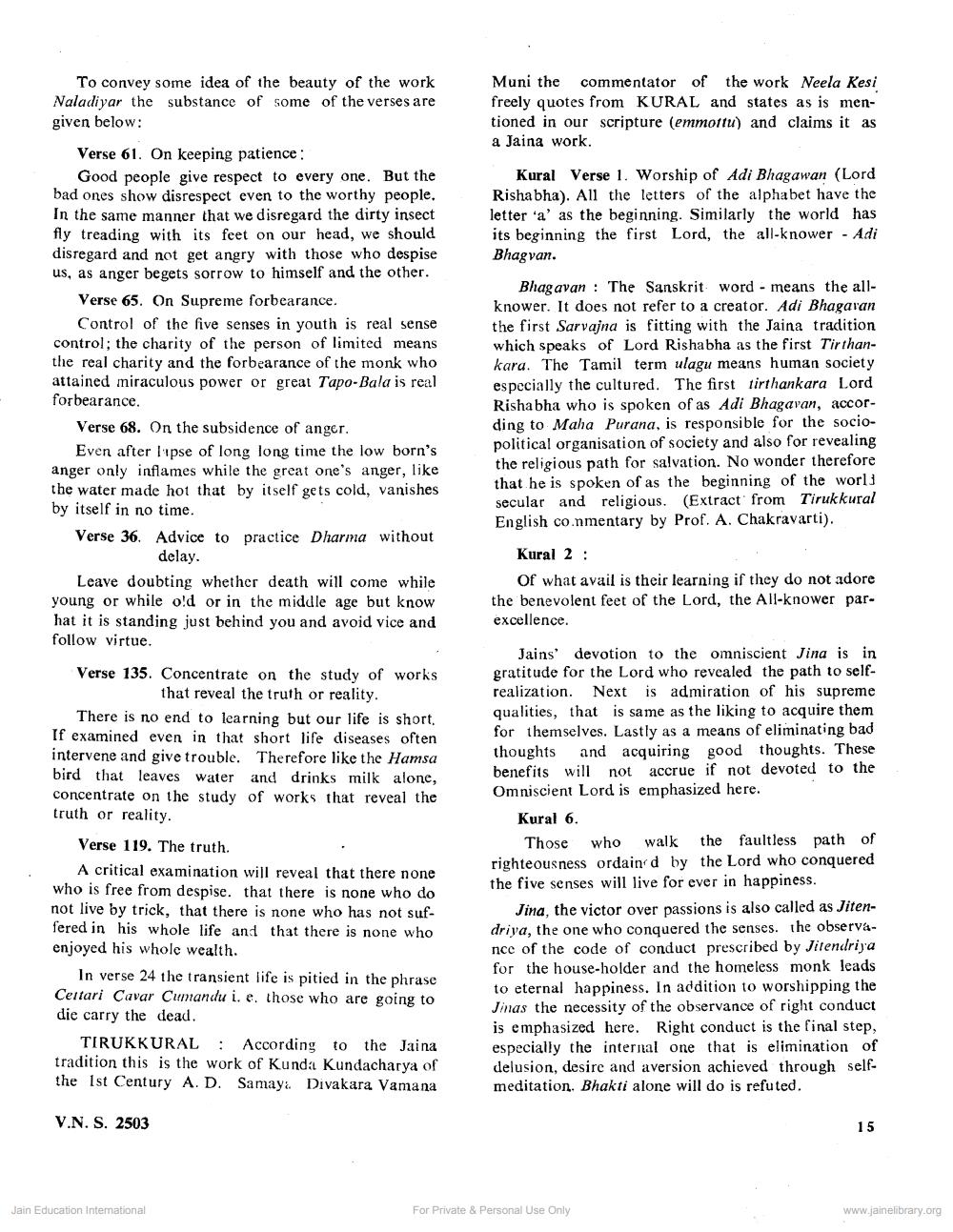________________
To convey some idea of the beauty of the work Naladiyar the substance of some of the verses are given below:
Muni the commentator of the work Neela Kesi freely quotes from KURAL and states as is mentioned in our scripture (emmottu) and claims it as a Jaina work.
Kural Verse 1. Worship of Adi Bhagawan (Lord Rishabha). All the letters of the alphabet have the letter 'a' as the beginning. Similarly the world has its beginning the first Lord, the all-knower - Adi Bhagvan.
Verse 61. On keeping patience:
Good people give respect to every one. But the bad ones show disrespect even to the worthy people, In the same manner that we disregard the dirty insect fly treading with its feet on our head, we should disregard and not get angry with those who despise us, as anger begets sorrow to himself and the other.
Verse 65. On Supreme forbearance.
Control of the five senses in youth is real sense control; the charity of the person of limited means the real charity and the forbearance of the monk who attained miraculous power or great Tapo-Bala is real forbearance.
Verse 68. On the subsidence of anger.
Even after lipse of long long time the low born's anger only inflames while the great one's anger, like the water made hot that by itself gets cold, vanishes by itself in no time. Verse 36. Advice to practice Dharma without
delay. Leave doubting whether death will come while young or while old or in the middle age but know hat it is standing just behind you and avoid vice and follow virtue.
Bhagavan : The Sanskrit word - means the allknower. It does not refer to a creator. Adi Bhagaran the first Sarvajna is fitting with the Jaina tradition which speaks of Lord Rishabha as the first Tirthankara. The Tamil term ulagu means human society especially the cultured. The first tirthankara Lord Rishabha who is spoken of as Adi Bhagavan, according to Maha Purana, is responsible for the sociopolitical organisation of society and also for revealing the religious path for salvation. No wonder therefore that he is spoken of as the beginning of the worl] secular and religious. (Extract from Tirukkural English co.nmentary by Prof. A. Chakravarti).
Kural 2 :
of what avail is their learning if they do not adore the benevolent feet of the Lord, the All-knower parexcellence.
Verse 135. Concentrate on the study of works
that reveal the truth or reality. There is no end to learning but our life is short. If examined even in that short life diseases often intervene and give trouble. Therefore like the Hamsa bird that leaves water and drinks milk alone, concentrate on the study of works that reveal the truth or reality.
Verse 119. The truth.
A critical examination will reveal that there none who is free from despise. that there is none who do not live by trick, that there is none who has not suffered in his whole life and that there is none who enjoyed his whole wealth.
In verse 24 the transient life is pitied in the phrase Centari Cavar Cumandu i. e. those who are going to die carry the dead.
TIRUKKURAL : According to the Jaina tradition this is the work of Kunda Kundacharya of the 1st Century A. D. Samaya Divakara Vamana
Jains' devotion to the omniscient Jina is in gratitude for the Lord who revealed the path to selfrealization. Next is admiration of his supreme qualities, that is same as the liking to acquire them for themselves. Lastly as a means of eliminating bad thoughts and acquiring good thoughts. These benefits will not accrue if not devoted to the Omniscient Lord is emphasized here.
Kural 6.
Those who walk the faultless path of righteousness ordaind by the Lord who conquered the five senses will live for ever in happiness.
Jina, the victor over passions is also called as Jitendriya, the one who conquered the senses. the observance of the code of conduct prescribed by Jitendriya for the house-holder and the homeless monk leads to eternal happiness. In addition to worshipping the Jinas the necessity of the observance of right conduct is emphasized here. Right conduct is the final step, especially the internal one that is elimination of delusion, desire and aversion achieved through selfmeditation. Bhakti alone will do is refuted.
V.N. S. 2503
15
Jain Education Intemational
For Private & Personal Use Only
www.jainelibrary.org




